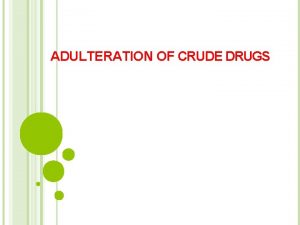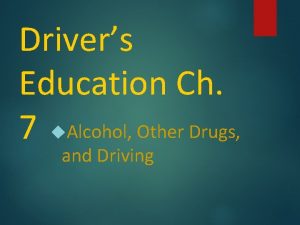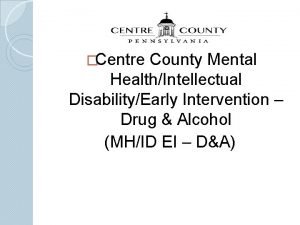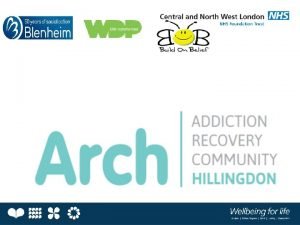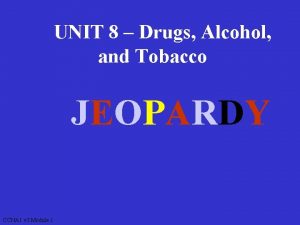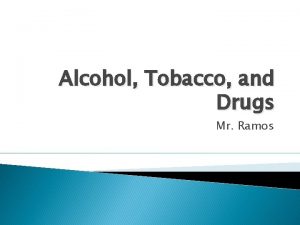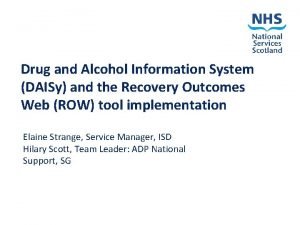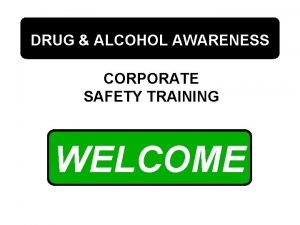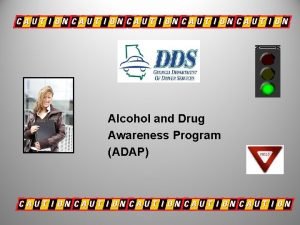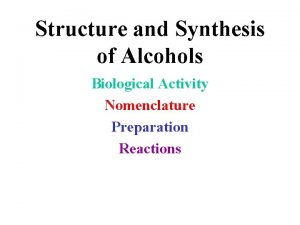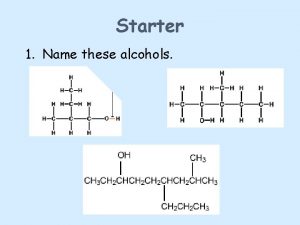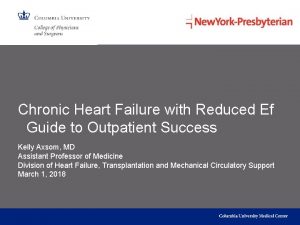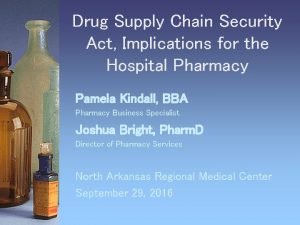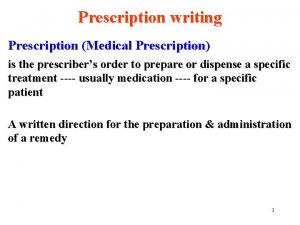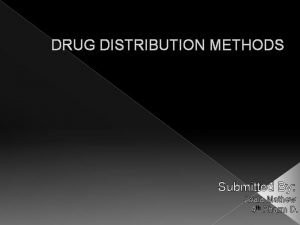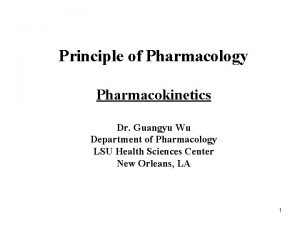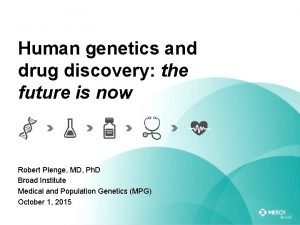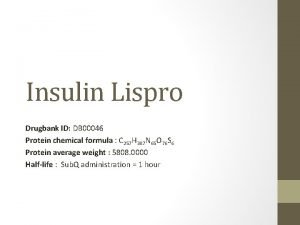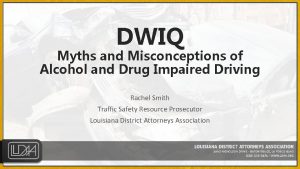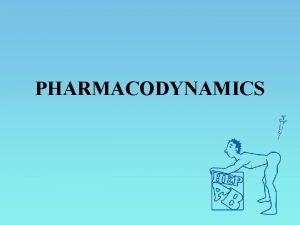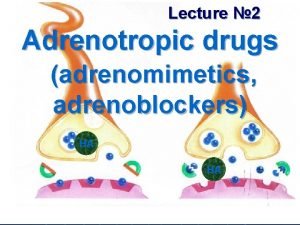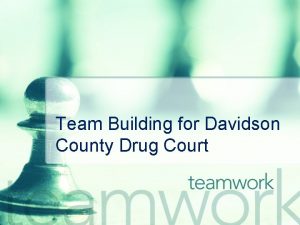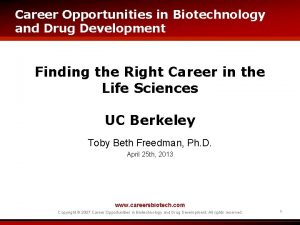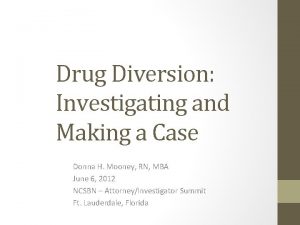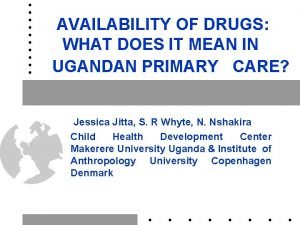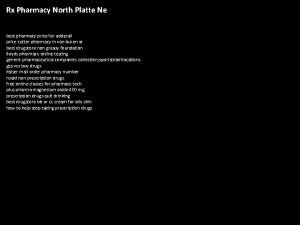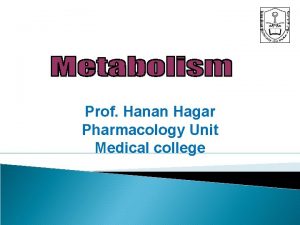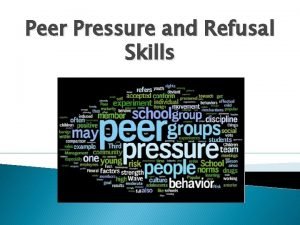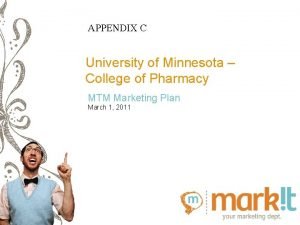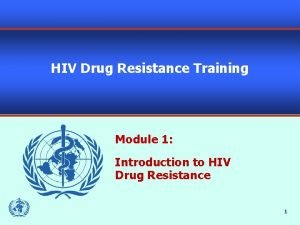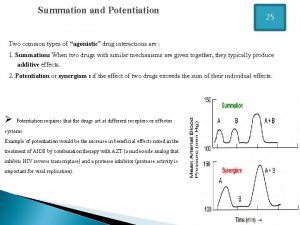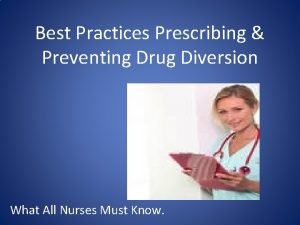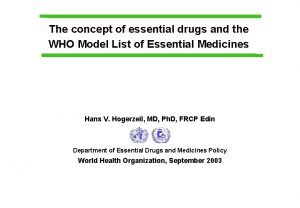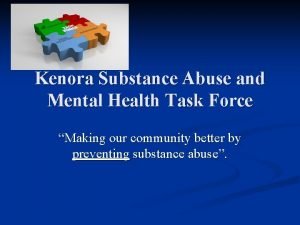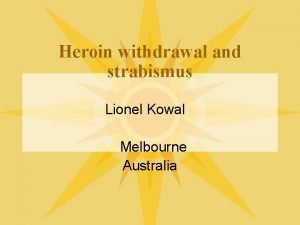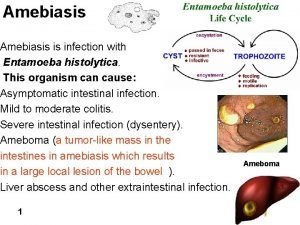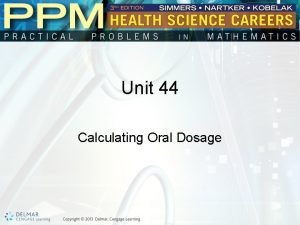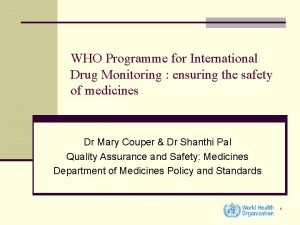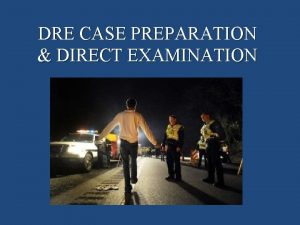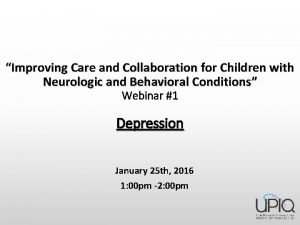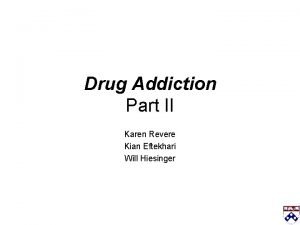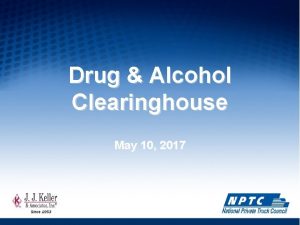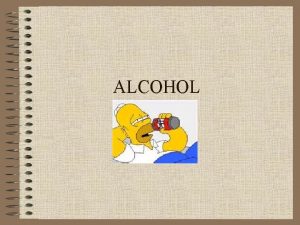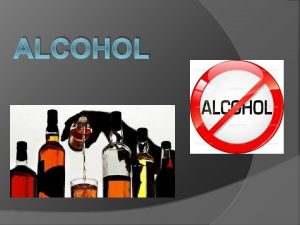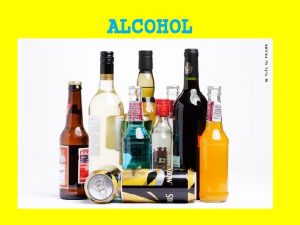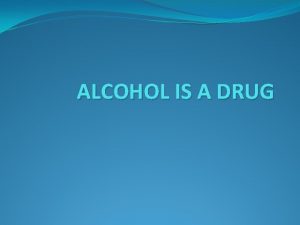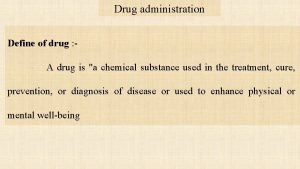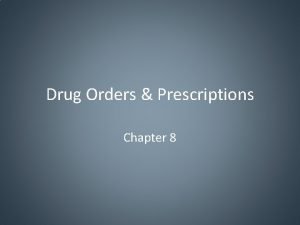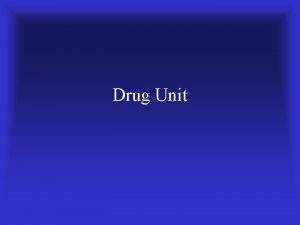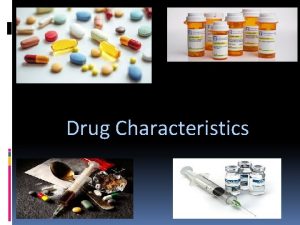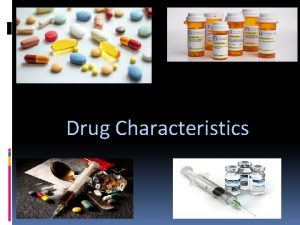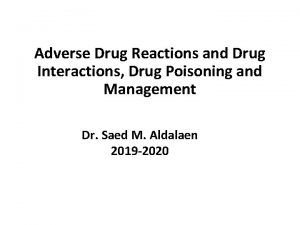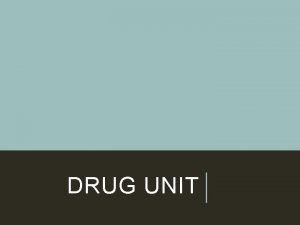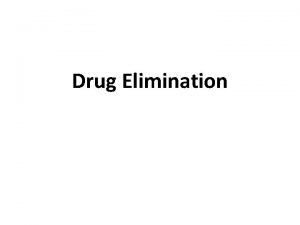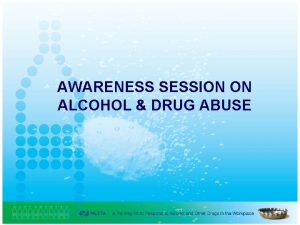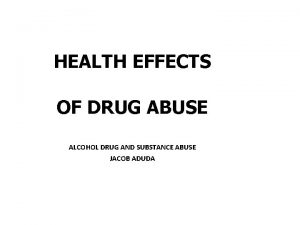ALCOHOL What is Alcohol Alcohol is a drug
























































- Slides: 56

ALCOHOL

What is Alcohol? • Alcohol- is a drug that is produced by a chemical reaction in fruits, vegetables, and grains. • Types of Alcohol – Used to kill germs ---- medicines, cleaners, and fuels – Ethanol alcohol- is produced by a chemical reaction called fermentation

What alcohol does to the brain and central nervous system • Depressants- are drugs that slow down the body’s functions and reactions. – Some people become relaxed and friendly – Others depressed angry • Alcohol makes it hard to think clearly and make good decisions • People make regretful decisions when under the influence of alcohol

Alcohol Use and Teens • Teens bodies and minds are still growing and developing until their mid 20’s • Research has shown that alcohol use can interfere with long and short-term growth. • can harm the brains ability to learn and its ability to remember • Teens who drink are more likely to fall behind in school, increase risk of social problems, depression, suicidal thoughts, and violence • It is illegal for anyone under 21 to use alcohol • If you are caught buying or drinking alcohol, you could be arrested, fined, or sent to a youth detention center

Alcohol Facts • Alcohol is the cause of hundreds of traffic accidents every year • 1/3 of all teen traffic deaths are related to alcohol.

Story Activity… • What a great day! The sun is shining and there is a cool breeze in the air. You decide to take a bike ride down to Burger King to meet up with some friends. It seems like out of nowhere a car flies up behind and hits you. • The police show up and you have to take an ambulance to the hospital. Both of your legs are broken and one of your arms is broken too. You will have to miss school and miss this years basketball season. You will heal and be fine, but it will take a long time and will be painful. • The police found out that this driver was DRUNK…As he sits in jail, write this driver a letter and tell him/her how you feel. What do you want this person to feel and/or do? What do you want to know? What types of questions would you ask? (2 Paragraphs, 10 sentences)

Why Some Teens Drink Alcohol • What Teens May Say 1. Drinking will help me forget about my problems I’ll look more grown-up and cool with a drink in my hand Movies make drinking look cool. My friend keeps pressuring me to try alcohol 2. 3. 4. 5. A drink will help me relax • 1. 2. 3. 4. 5. What Teens Should Know The problems will still be there when the effects of alcohol wear off You won’t look mature getting in trouble for underage drinking Movies don’t always show the true risk/reality of drinking alcohol Real friends won’t pressure you to try something illegal Alcohol interferes with sleep and performance in school or other activities, creating stress

Why Some Teens Drink Alcohol What Teens May Say What Teens Should Know • “Drinking will help me forget about my problems” • “I’ll look more grown-up with a drink in my hand” • “Movies make drinking look cool” • “My friends keep pressuring me to try alcohol” • “A drink will help me relax” • The problems will still be there when the effects of alcohol wear off • You won’t look mature getting in trouble for underage drinking • Movies don’t always show the risks associated with drinking alcohol • Real friends won’t pressure you to do something illegal • Alcohol interferes with sleep and performance in school or other activities, creating stress

Reasons Not to Drink • Some teens may believe that drinking alcohol will help them fit in with their peers • In reality, most teens are not drinking alcohol. • Many realize the negative effects alcohol can have on their health and are saying no to alcohol use • You risk your health when you drink • Using alcohol is against the law for teens • You want to make decisions that will help you become a strong person

Alternatives to Drinking Alcohol • • Alternatives- other ways of thinking or acting Sports Learning new skills Discovering a new talent Challenging your body Pursuing interests in theater Volunteering in your community Becoming an advocate (SADD)- Students Against Destructive Decisions, (T. A. T. U) Teens Against Tobacco Use

Question You are at an amusement park with several friends. When it is time to leave, a friend’s brother offers to give you a ride. You believe you smell alcohol on his breath. What should you do, and why?

Short-Term Effects Of Alcohol Use

Alcohol and the Body • Fast acting drug • Quickly absorbed by the bloodstream and reaches the brain within 30 seconds after being swallowed • Absorption can be delayed if the person who drinks has eaten a heavy meal • Once alcohol reaches the brain it slows down reaction time- the ability of the body to respond quickly and appropriately to situations

Intoxication • The livers job is to break down alcohol once it enters the bloodstream • It breaks down approximately 95% of all alcohol consumed • The remaining 5% passes out of the body through sweat, urine, and breath • Intoxication- a persons mental and physical abilities have been impaired by alcohol – If the amount of alcohol a person drinks is more than what his or her body can tolerate

Blood Alcohol Content • Blood alcohol content (BAC) is a measure of the amount of alcohol present in the persons blood – BAC is expressed as a percentage of the total amount of blood in the body – 0. 02% is enough to may most people feel lightheaded – 0. 08% is enough to make it dangerous for a person to drive • Considered legally intoxicated • Alcohol poisoning- a dangerous condition that results when a person drinks excessive amounts of alcohol over a short time period

Alcohol’s Journey Through the Body • Mouth and Esophagus – Alcohol enters the body through the mouth. It travels down the esophagus to the stomach • Heart and Blood Vessels – The heart pumps the alcohol throughout the body • Brain and Nervous System – Alcohol affects memory, speech, judgment, vision, and hearing • Liver – – Alcohol is broken down. It is changed into water and carbon dioxide gas 90% leaves the body The remainder is eliminated as liquid waste or escapes through the pores or breath • Stomach and Pancreas – – People become sick and may vomit Passes into the small intestines Some is absorbed into the bloodstream Some of it passes into the liver

How Alcohol Affects the Individual • Gender and body size – Females and smaller people are affected more quickly than males and larger people • Other drugs – Alcohol mixed with other drugs or medicines can be deadly. – Increase the effects of other drugs • Food – Slows down alcohol absorption • General Health – How healthy and well rested a person is affects how the body responds to alcohol – Someone who is tired or sick will be affected more quickly • How fast you drink – Faster a person drinks, the more he or she will be affected • How much you drink – Different alcoholic beverages contain different amounts of alcohol – Drinking a lot or very quickly overworks the liver and causes intoxication

Alcohol Content of Different Drinks BEER (12 oz) = WINE (5 oz) = LIQUOR (1. 5 oz)

Alcohol Use and Violence • Those who drink are more likely to fight or behave violently • Alcohol makes people aggressive • Can cause violence both in and outside the home • 2/3 of all domestic violence cases are related to alcohol abuse • Violence also increases at sporting events where alcohol is served

• http: //www. abcactionnews. com/news/nation al/uconn-students-riot-with-fire-violence-asthey-celebrate-national-championship

Alcohol and Nutrition • Long-term use can lead to malnutrition- a condition in which the body doesn’t get the nutrients it needs to grow and function properly • Alcohol has calories which have no nutritional value • If a person drinks for long periods of time and doesn’t each enough healthy food, he or she may not be getting enough nutrients • The calories can also add unwanted weight gain

Question Allie is at a party at a friend’s house. She has had trouble sleeping lately because of worries over a big exam. Someone at the party suggests everyone a beer. What are at least two good reasons Allie should say no?

Long-Term Effects of Alcohol Use

Physical Effects of Alcohol Use • Can cause major damage to organs like the stomach, liver, pancreas, and heart • Can lead to long-lasting learning and memory problems • Because it is a depressant it affects a person’s emotional health • Mood changes • Depression • Can lead a teen to commit suicide • Can become addictive

Alcohol and the Mouth • Not digested like other foods • Absorbed by the tissues lining the mouth and stomach, and goes directly into the blood stream • More likely to develop mouth or throat cancer than people who don’t drink alcohol

Alcohol and the Stomach • Alcohol irritates the stomach lining and increases the amount of acid • Extra acid makes the lining red and swollen and can produce ulcers-sores that cause bleeding • Also weakens the valve that separates the stomach from the esophagus, which prevents acid from entering the esophagus • Weakened valves cause heartburn

Alcohol and the Liver • One of the most serious effects is damage to the liver • If alcohol is frequently in the blood, liver cells die • Fatty Liver- fat builds up in the liver and cannot be broken down – Increased amounts of fat prevent the liver from working normally and from repairing itself • Cirrohosis- disease characterized by scarring and eventual destruction of the liver – Scarring reduces blood flow in the liver – Cannot carry out its key function – removing poisons from the blood

Alcohol and the Brain • Disrupts the parts of the brain responsible for memory and problem solving • Destroys brain cells • Brain cells do not grow back • Block messages that are sent to the brain • Cause problems with movement, vision, and hearing

Question Even simple acts can be difficult when intoxicated. How might intoxication affect a person’s daily activities?

Alcohol and the Heart • Heavy drinking damages heart muscle, causing the heart to become weakened and enlarged, and leads to high blood pressure • Increases the risk of congestive heart failure and stroke • Raises the level of some fats in the blood

Driving While Intoxicated (DWI) • A person with a BAC of 0. 08 % is considered legally intoxicated or drunk • Long term consequences of DWI is causing your own death or the death of another • On average, someone is killed in a crash involving alcohol every 31 minutes. • In 2005, over 16, 000 people were killed in alcohol related crashes – That accounts for 39% of all traffic deaths that year • ***the driver is not the only person at risk, passengers, pedestrians, and other drivers are all potential victims of a person who is DWI***

Question About 3 in every 10 Americans will be involved in an alcohol related crash at some time in their lives. How can you reduce your risk of being involved in an alcohol related crash?

Binge Drinking • Binge drinking- the consumption of a large quantity of alcohol in a very short period of time • Dangers – Death due to falls, drowning, or drunk driving – Pregnancy or contraction of sexually transmitted diseases due to sexual activity – Being a victim of violent behavior – Death from alcohol poisoning

Alcohol Use and Teen Pregnancy • Can be a long-term consequence • Lower a person’s inhibitions and affects the ability to make healthy decisions • Inhibitions- conscious or unconscious restraint of a person’s own behaviors or actions • People say things they normally wouldn’t • Could negatively affect their future • Pregnancy is usually unplanned • Study of teen pregnancies showed 1/3 had been using alcohol • Disrupts long-term goals such as college • Not prepared emotionally or financially to be parents

Fetal Alcohol Syndrome • Everything a female eats and drinks affects her unborn baby • Alcohol is passed into the baby’s blood • Baby’s liver is not developed enough to break down alcohol • Fetal Alcohol Syndrome (FAS) – is a group of alcohol-related birth defects that include both physical and mental problems – – Smaller body sizes Lower birth rate Develop problems in hearts and kidneys Alcohol limits the supply of oxygen to the baby’s brain, which can cause learning disabilities and mental retardation can occur

Question Signs appear in restaurants and other locations where alcohol is stating Government Warning: (1) ACCORDING TO THE SURGEON GENERAL WOMEN SHOULD NOT DRINK ALCHOLIC BEVERAGES DURING PREGNANCY BECAUSE OF THE RISK OF BIRTH DEFECTS (2) CONSUMPTION OF ALCOHOLIC BEVERAGES IMPAIRS YOUR ABILITY TO DRIVE A CAR OR OPERATE MACHINERY, AND MAY CAUSE HEALTH PROBLEMS Why do you think it is important to post these types of warning labels?

Alcoholism and Alcohol Abuse

Alcohol’s Addictive Power • It is habit forming • Addiction- a physical or psychological need for a drug • Teens 15 and younger are four times more likely to become addicted than older individuals • Addiction takes the focus off of healthy goals and damages relationships with family and friends

The Disease of Alcoholism • Alcoholism- is a progressive, chronic disease involving a mental and physical need for alcohol • People with alcoholism are called alcoholics • Estimated 14 million Americans are alcoholics or have an alcohol abuse problem • Risky drinking can lead to mental, emotional, and health problems

1. Denial 5 Major Symptoms of Alcoholism - Has a hard time believing they have a problem. They are usually the last to admit they need help 2. Craving - Has a strong need, or compulsion, to drink 3. Loss of control - Unable to limit drinking on any given occasion 4. Tolerance - A process in which your body needs more and more of a drug to get the same effect 5. Physical Dependence - Type of addiction in which the body itself feels a direct need for a drug Symptoms- sweating, shakiness, intoxication

Common Signs of Alcoholism • Drinking alone • Making excuses to drink • • Need for daily or frequent use of alcohol in order to • function • • Lack of control over drinking, with inability to • stop or reduce the amount • of alcohol being consumed • • Episodes of violence associated with drinking • • Secretive behavior to hide • alcohol-related behavior Hostility when confronted about drinking Neglecting to eat regularly Neglecting to take care of physical appearance Nausea and vomiting Shaking in the morning Abdominal pain Numbness and tingling confusion

Question What should you do if you think that someone you are close to has an alcohol-related problem?

Costs to the Family • Denial is the biggest symptom of this disease and is a problem for family and friends • They don’t believe the drinker has a problem • Just assume the drinker needs to stop drinking or cut down consumption • Sometimes neglect their own needs to help alcoholic • Enablers- are persons who create an atmosphere in which the alcoholic can comfortably continue his or her unacceptable behavior – Make excuses for or lying on behalf of alcoholic – Believe that these actions can help, but they don’t – This prevents alcoholic from getting treatment for disease

Question Speaking honestly to a family member about an alcoholic problem is better than trying to hide the problem. How can enabling be harmful for both an alcoholic and family members?

Costs to Society • Underage drinking costs society more than 50 billion dollars a year • Total cost of alcohol-related problems is approx. 175. 9 billion dollars a year • Cost businesses billions of dollars a year in lost productivity- how much work a person does while on the job

Alcohol Abuse • Alcohol abuse- is a pattern of drinking that results in one or more well-defined behaviors within a 12 -month period. • 4 symptoms – Failure to fulfill major work, school, or home responsibilities – Drinking in situations that are physically dangers. EX- drinking while intoxicated, riding in a car driven by someone who is drinking alcohol – Having ongoing alcohol-related legal problems. These may include arrests for DWI or physically hurting someone while drunk – Continuing to drink even when relationships have been negatively affected by the person’s use of alcohol.

Question You are at a friend’s house. You overhear your friend’s father say, “I do not have a drinking problem. ” Your friend looks uncomfortable, then says, “He really doesn’t have a problem, you know. ” What kind of behavior is your friend demonstrating?

Getting Help for Alcohol Abuse

Help for People with Alcohol Problems • Intervention- is a gathering in which family and friends get the problem drinker to agree to seek help • The drinker is confronted with facts of his or her problem and strongly urged to stop drinking

Starting Down the Road to Recovery • Begins with the alcoholics understanding that he or she has an addiction and must never drink, again. • Relapse- a return to the use of a drug after attempting to stop • Recovery starts only after the alcoholic makes the commitment never to drink again • Recovery- is the process of learning to live an alcohol free life and is usually long and difficult • Withdrawal- is the physical and psychological reactions that occur when someone stops using an addictive substance – Can be mild to very severe and include headaches, tiredness, strong mood swings, and nausea

Question Support groups are available to teens with an alcoholic in their family. What are the benefits of joining such group?

Steps Along the Road • Admission – Start to recovery, the person must admit that he or she has an addiction and ask for help • Counseling – Alcoholics Anonymous (AA) • Detoxification – The physical process of freeing the body of an addictive substance • Resolution – Alcoholic resolves or makes the decision to accept responsibility for his or her actions – Moving forward the person is referred to as a recovering alcoholic

Help for the Family • Family members need to recover, especially enablers • Al-Anon- nonprofit group teaches family and friends about alcoholism and helps them understand how they have been affected • Teaches them coping skills • Alateen

Ways to Stay Alcohol Free • Avoid situations when alcohol may be present • Choose friends who are alcohol free • Practice the S. T. O. P. Strategy Say no in a firm voice Tell why not Offer another idea Promptly leave

Question Imagine that a friend admits to having a drinking problem. The way he plans to handle the problem is to gradually cut down on his drinking. Is this a wise plan? Why or why not?

Peer Pressure http: //journalbuddies. com/journal_prompts__journal_topics/3 2 -substance-abuse-prevention-writing-ideas-for-kids/ 1. Say no firmly 2. Repeat the word ‘no’ over and over 3. Give a believable excuse 4. Give a reason 5. Change the subject 6. Suggest an alternate activity 7. Ignore the problem/act dumb 8. Reverse the pressure
 Different methods of adulteration of crude drugs
Different methods of adulteration of crude drugs Chapter 7 drivers ed
Chapter 7 drivers ed 12 core functions of substance abuse counseling
12 core functions of substance abuse counseling Centre county drug and alcohol
Centre county drug and alcohol Arch hillingdon
Arch hillingdon Drug and alcohol jeopardy
Drug and alcohol jeopardy Why is alcohol considered a drug
Why is alcohol considered a drug Tobacco
Tobacco Drug and alcohol information system (daisy)
Drug and alcohol information system (daisy) Drug and alcohol safety training
Drug and alcohol safety training Tadra is an acronym for
Tadra is an acronym for Formation of alcohols
Formation of alcohols Ketone to tertiary alcohol
Ketone to tertiary alcohol Antagonist drug
Antagonist drug Smartie drug
Smartie drug Nature reviews drug discovery
Nature reviews drug discovery Fda dscsa timeline
Fda dscsa timeline How to write a prescription
How to write a prescription Detromethorphan
Detromethorphan P drug concept
P drug concept Drug basket method is used for
Drug basket method is used for Methodist health system drug test
Methodist health system drug test Drug efficacy
Drug efficacy Factors affecting drug distribution
Factors affecting drug distribution Drug efficacy
Drug efficacy Gloripa 10 mg
Gloripa 10 mg Which one is correct about “before meal drug”?
Which one is correct about “before meal drug”? Aride drug matrix
Aride drug matrix Difference between tolerance and tachyphylaxis
Difference between tolerance and tachyphylaxis Alpha 2 receptors location
Alpha 2 receptors location Davidson county drug court
Davidson county drug court Mitre center for transforming healrh
Mitre center for transforming healrh What is ideal drug
What is ideal drug Career opportunities in biotechnology and drug development
Career opportunities in biotechnology and drug development R v big m drug mart
R v big m drug mart Investigating and making a case for drug diversion
Investigating and making a case for drug diversion Drug availability means
Drug availability means Rx express north platte
Rx express north platte Metabolism of drug definition
Metabolism of drug definition Peer influence
Peer influence Sterling drug albert lea
Sterling drug albert lea Drug resistance training
Drug resistance training Expert opin drug discov
Expert opin drug discov Summation of drugs
Summation of drugs Tpsalert
Tpsalert Controlled substance log example
Controlled substance log example Drug diversion best practices
Drug diversion best practices Essential drug
Essential drug Drug abuse
Drug abuse Stock dose formula
Stock dose formula Lionel kowal
Lionel kowal Drug of choice for the treatment of extraluminal amebiasis
Drug of choice for the treatment of extraluminal amebiasis Drug calculation formula
Drug calculation formula Who program for international drug monitoring
Who program for international drug monitoring Aride drug matrix
Aride drug matrix Zoloft dosage chart
Zoloft dosage chart Drug rehab revere
Drug rehab revere
